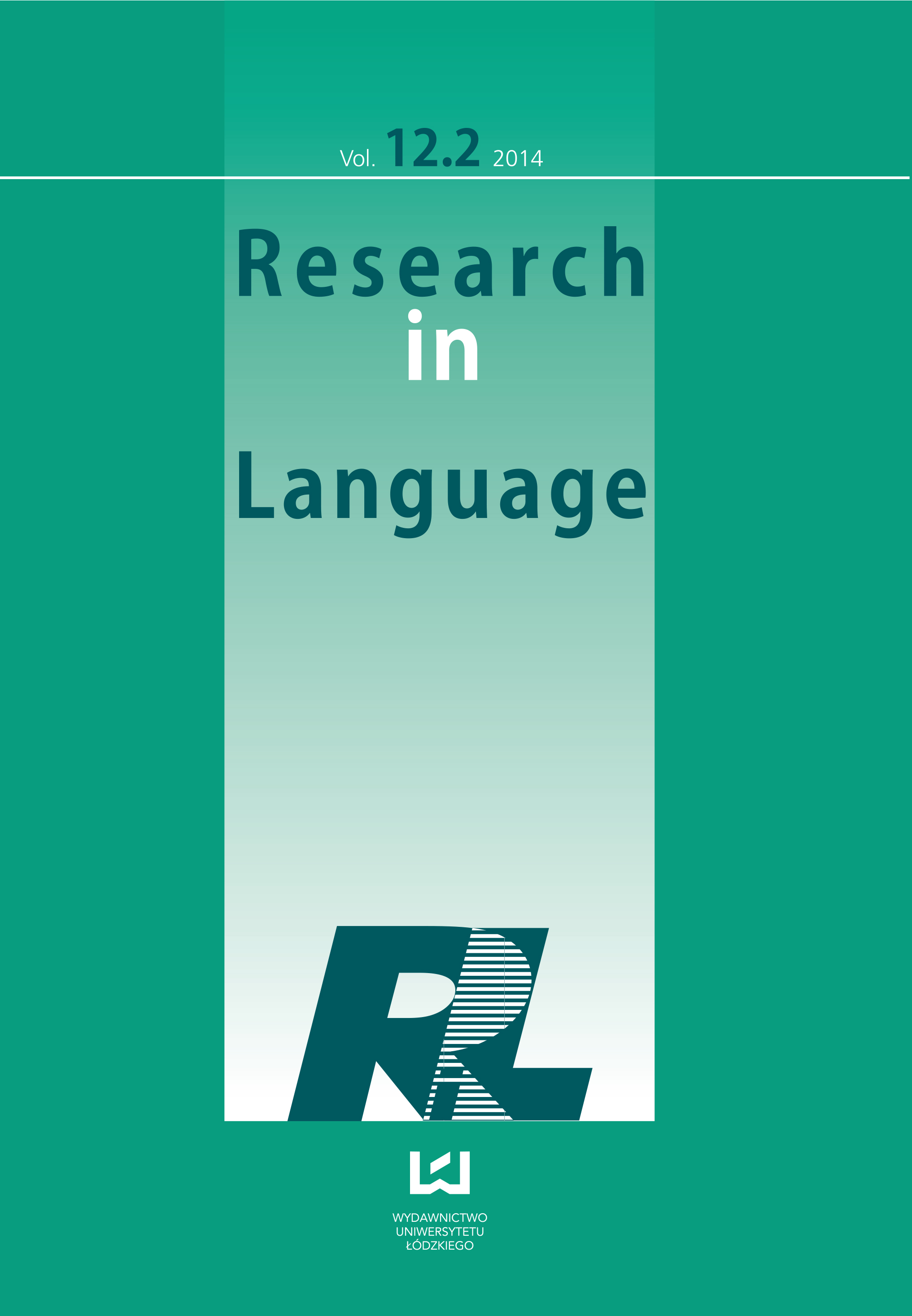Acoustic Correlates of Word Stress as a Cue to Accent Strength
DOI:
https://doi.org/10.2478/rela-2014-0008Keywords:
Czech English, word stress, duration, F0, SPL, spectral slopeAbstract
Due to the clear interference of their mother tongue prosody, many Czech learners produce their English with a conspicuous foreign accent. The goal of the present study is to investigate the acoustic cues that differentiate stressed and unstressed syllabic nuclei and identify individual details concerning their contribution to the specific sound of Czech English. Speech production of sixteen female non-professional Czech and British speakers was analysed with the sounds segmented on a word and phone level and with both canonical and actual stress positions manually marked. Prior to analyses the strength of the foreign accent was assessed in a perception test. Subsequently, stressed and unstressed vowels were measured with respect to their duration, amplitude, fundamental frequency and spectral slope. Our results show that, in general, Czech speakers use much less acoustic marking of stress than the British subjects. The difference is most prominent in the domains of fundamental frequency and amplitude. The Czech speakers also deviate from the canonical placement of stress, shifting it frequently to the first syllable. On the other hand, they seem to approximate the needed durational difference quite successfully. These outcomes support the concept of language interference since they correspond with the existing linguistic knowledge about Czech and English word stress. The study adds specific details concerning the extent of this interference in four acoustic dimensions.
References
Beckman, M. E. 1986. Stress and Non-Stress Accent. Dordrecht: Foris.
Google Scholar
Boersma, P. and Weenink, D. 2013. Praat: doing phonetics by computer (version 5.3.41). Retrieved from http://www.praat.org/
Google Scholar
Crystal, D. 1996. The past, present and future of English rhythm. In M. Vaughan-Rees (ed) Changes in Pronunciation. Whitstable: IATEFL Pronsig.
Google Scholar
Cutler, A. 2005. Lexical stress. In D. B. Pisoni and R. E. Remez (eds) The handbook of speech perception. Oxford: Blackwell: 264-289.
Google Scholar
Fry, D. B. 1955. Duration and intensity as physical correlates of linguistic stress. Journal of the Acoustic Society of America 27: 765-768.
Google Scholar
Fry, D. B. 1958. Experiments in the perception of stress. Language and Speech 1: 126-152.
Google Scholar
Hammarberg, B., Fritzell, B., Gauffin, J., Sundberg, J. and Wedin, L. 1980. Perceptual and acoustic correlates of abnormal voice qualities. Acta Otolaryngologica 90: 441-451.
Google Scholar
Janota, P. and Palková, Z. 1974. Auditory evaluation of stress under the influence of context. AUC Philologica 2/1974, Phonetica Pragensia, 4: 29-59.
Google Scholar
Klatt, D. H. 1976. Linguistic uses of segmental duration in English: Acoustic and perceptual evidence. Journal of the Acoustical Society of America 59: 1208-1221.
Google Scholar
Palková, Z. and Volín, J. 2003. The role of F0 contours in determining foot boundaries in Czech. Proceedings of the 15th ICPhS 2: 1783-1786. Barcelona: UAB.
Google Scholar
Sluijter, A. and van Heuven, V. 1996. Acoustic correlates of linguistic stress and accent in Dutch and American English. Proceedings of the 4th International Conference on Spoken Language Processing, 630-633. Philadelphia.
Google Scholar
Volín, J. 2008. Z intonace čtených zpravodajství: výška první slabiky v taktu [Intonation in newsreading: pitch of the first syllable in a stress group]. Čeština doma a ve světě 3-4: 89-96.
Google Scholar
Volín, J., Weingartová, L. and Skarnitzl, R. 2013. Spectral Characteristics of Schwa in Czech Accented English. Research in Language 11(1): 31-39. DOI: 10.2478/v10015-012-0008-6
Google Scholar
Weingartová, L. and Volín, J. 2014. Short-term spectral slope measures and their sensitivity to speaker, vowel identity and prominence. Akustické listy 20(1): 5-12.
Google Scholar
Wells, J. C. 2008. Longman Pronunciation Dictionary (3rd ed.). Harlow: Pearson Education Limited.
Google Scholar
Downloads
Published
How to Cite
Issue
Section
License

This work is licensed under a Creative Commons Attribution-NonCommercial-NoDerivatives 4.0 International License.










